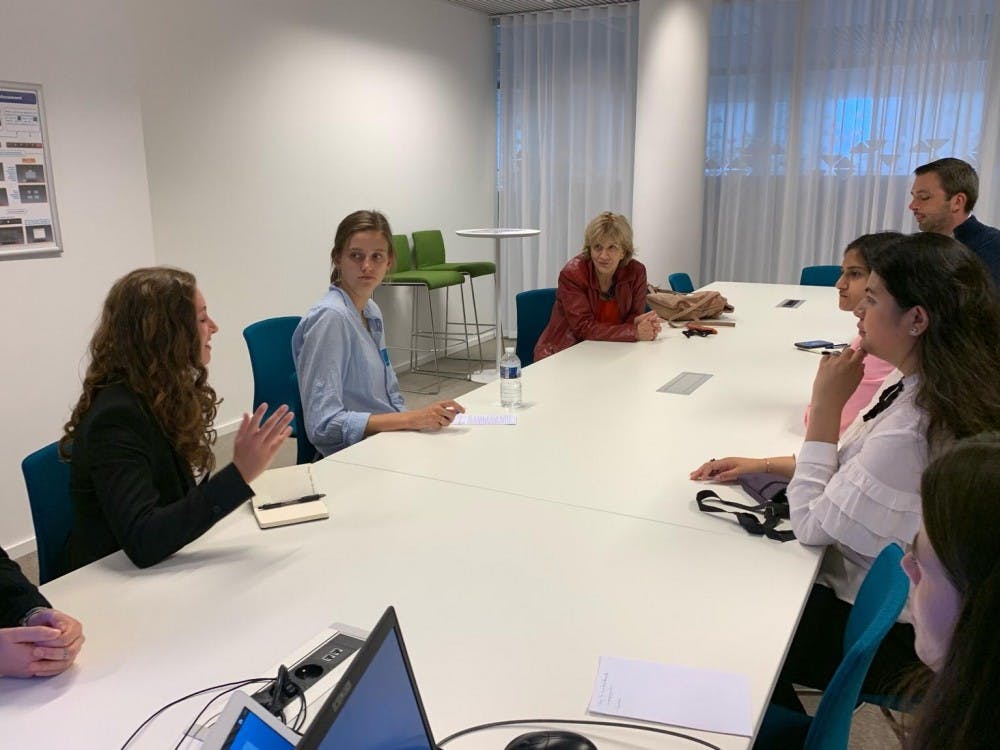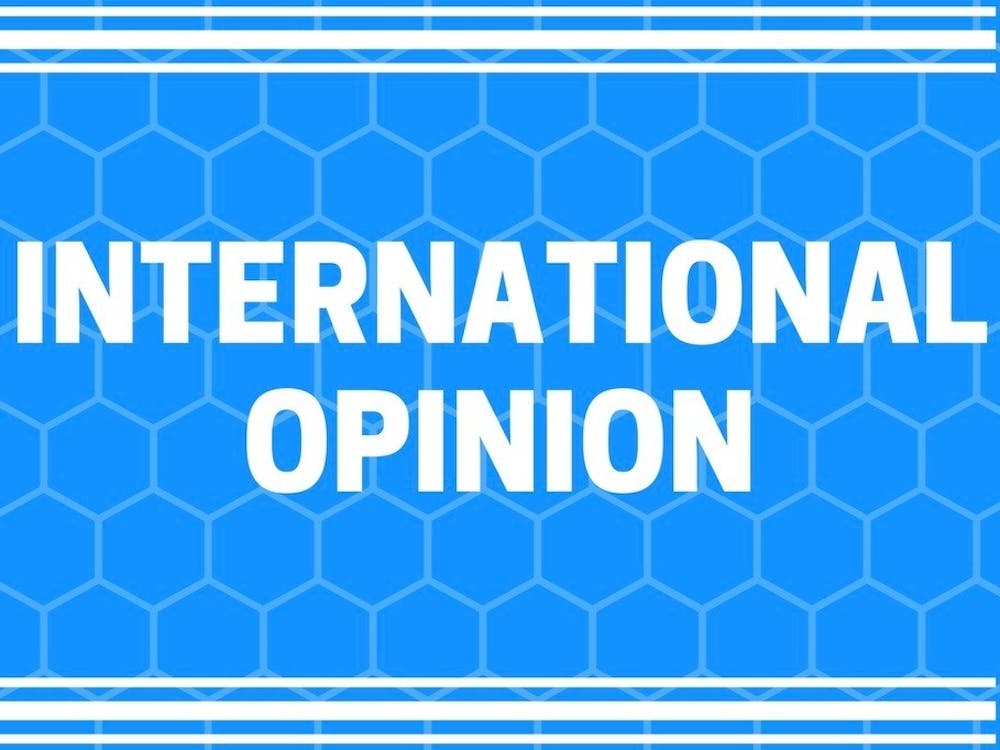Media has long been the force that uncovers truth and ensures accountability, but there is no one checking the truth and accountability of media.
As a result, and perhaps because of fear of regulating free speech, news is now plagued with disinformation, which has infiltrated public perception and influenced decision making. The fate of the media and the possibility of having an informed public reside in the ability to counter disinformation.
This summer, I spent a week at the European Union headquarters in Brussels, Belgium, speaking with both government officials and media professionals about fighting disinformation. The question that continually made its way into every conversation was whether communication can be an alternative to legislation.

Emma Davis, far left, proposes disinformation solutions to Marjory van den Broeke, Deputy Spokesperson and Head of the Press Unit at the European Parliament.
Whenever it comes to legislation, there is a concern about limiting freedom. When regulatory action is considered to address the ongoing disinformation issue, there is concern about limiting free speech.
Are free speech and disinformation linked? Can we fight disinformation but still maintain free speech for the media?
When pondering these questions, a key factor to consider is the mutual interest both media and government have in fighting disinformation; disinformation poses a mutual peril.
The European Union’s foreign and security policy stresses the necessity of multilateralism, an alliance of multiple parties pursuing a common goal. Coordination and unity among the member states, as well as partnerships with other countries, are essential components of the EU’s peacekeeping and conflict prevention efforts.
The EU’s multilateral approach appears to also include nontraditional partners such as the media, but there are different degrees to which this collaboration between government and the media has been successful.
There is a clear difference between the success of EU collaboration with traditional media and with social media.
I spoke with both Meg Chang, Facebook’s public policy manager of elections, and Ulrik Trolle Smed, member of the cabinet to Julian King, European Commissioner for the Security Union, while in Brussels. Both work in their separate organizations to fight disinformation.
In my conversation with Chang, I saw a lack of transparency toward the public in the policies she presented, and after speaking with Trolle Smed I saw this lack of transparency also extended to the social media platform’s conversations with the EU.
Enjoy what you're reading?
Signup for our newsletter
Trolle Smed specifically said that the surface-level conversation I, as a student, had had with Facebook was the same conversation the Commission had been having with the company for years.
Facebook does not have the regulation mainstream media does, so it is not held accountable. Instead, Facebook operates like its own independent country, which is shown by its lack of adherence to laws of the countries where it operates.
After returning from the EU, I spoke with Jacob Mchangama, a free speech lawyer, and the founder and director of Justitia, a Copenhagen think tank focusing on human rights and the rule of law. Mchangama said it was better to let false news and even hate speech circulate than to give government the right to censor.
Mchangama’s reasoning aligns with that of the “slippery slope” argument -- once one thing is limited, the reasoning used to limit it can be used to limit further things.
When considering removing disinformation, viewpoint discrimination is another concern.
We tend to rationalize limiting free speech when the ideas we hold most sacred are being challenged. When our beliefs are rejected, we take the principle stand on free speech, refusing to compromise or recognize the faults in our rationale. But when we consciously examine our beliefs from a place of composure, we can see that standing on principle alone fails to account for the complexity of the issue at hand.
The free speech argument is certainly valid, but the media is attacking itself and the platform on which it stands. A few media outlets cannot spread disinformation without encouraging distrust in the entire system. Action must be taken.
This is why, in this case, communication may be more effective than legislation.
Although strides have been made by the EU to regulate disinformation spread in the media, the EU has been most successful in its use of communication to expose disinformation and inform people of the issue.
For example, the EU vs Disinfo website created by the East StratCom Task Force is used to raise awareness of Russia’s ongoing disinformation campaign through a weekly disinformation review, a continuously updated catalog of disinformation cases and analysis articles. The site’s products are distributed in many forms of media -- including social media and television -- and during public events.
In Brussels, I spoke with Marjory van den Broeke, deputy spokesperson and head of the press unit at the European Parliament, who began her career at the Associated Press. She has used her journalistic knowledge to communicate policies in easily understandable ways, and by doing so, she has helped combat disinformation that is spread on such policies.
Communication between journalists and government has also aided both in their shared goal of fighting disinformation.
One of the most valuable assets of communication I saw was the relationships between journalists and government officials. I met with Lotte Mejlhede, journalist and anchor at Danish TV 2, and it became evident that her ability to report accurately was largely because of the contacts she had inside the EU.
In today’s political climate, words can incite fear, anger and hope. We have seen the words of political figures mobilize people and incite action in ways legislation has not, whether that be because of lack of legislation or the facade of free choice political speech garners.
When people communicate in ways that speak to us, we act upon their words not because we are forced to but because we want to. We choose to act.
Whether it be directly or indirectly, the networks that media and government share allow for communication to play a key role in public perception and knowledge.
This is why communication, as opposed to legislation, addressing disinformation may actually be a way to combat disinformation while still upholding not only free speech but freedom in general.
Contact news writer Emma Davis at emma.davis@richmond.edu.
Support independent student media
You can make a tax-deductible donation by clicking the button below, which takes you to our secure PayPal account. The page is set up to receive contributions in whatever amount you designate. We look forward to using the money we raise to further our mission of providing honest and accurate information to students, faculty, staff, alumni and others in the general public.
Donate Now



